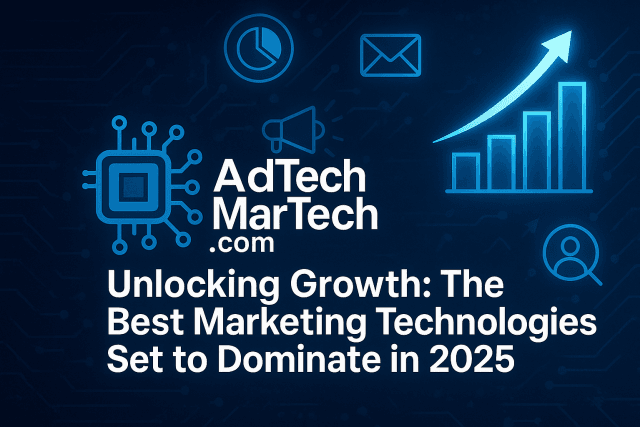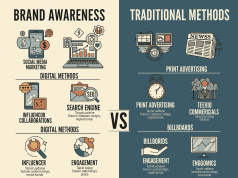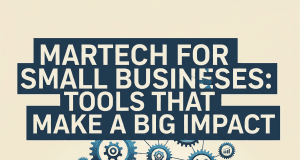As we approach 2025, the landscape of marketing technology continues to evolve rapidly. Businesses are constantly searching for innovative solutions to engage consumers, streamline operations, and ultimately drive revenue. With the rise of artificial intelligence (AI), machine learning, data analytics, and automation, the future of marketing technology holds immense promise. Let’s explore the key trends and tools set to dominate in 2025 and how they can unlock growth for organizations.
1. Artificial Intelligence and Machine Learning
AI and machine learning will play a pivotal role in marketing strategies by providing deeper insights into consumer behavior and preferences. These technologies can analyze vast amounts of data at lightning speed, enabling marketers to tailor their content and campaigns with unmatched precision.
Key Applications:
- Predictive Analytics: AI can forecast consumer behavior based on historical data, allowing brands to focus their efforts on high-potential leads.
- Personalized Content: Machine learning algorithms can curate content tailored to individual user preferences, enhancing engagement rates.
2. Voice Search Optimization
With the increasing popularity of smart speakers and voice-activated devices, optimizing for voice search is becoming critical. By 2025, it is estimated that over half of all online searches will be conducted via voice.
Strategies for Success:
- Natural Language Processing (NLP): Marketers will need to adopt NLP strategies to understand and incorporate conversational language into their content.
- Local SEO Focus: Businesses will benefit from optimizing for local search terms, as many voice searches are location-based queries.
3. Augmented Reality (AR) and Virtual Reality (VR)
AR and VR are not just trends; they are revolutionizing how consumers interact with brands. By creating immersive experiences, marketers can enhance customer engagement, making the buying process more interactive and enjoyable.
Potential Use Cases:
- Virtual Try-Ons: Retailers can use AR to allow customers to visualize how products will look on them before purchase.
- Experiential Marketing: VR can create virtual showrooms or events, reaching audiences who cannot physically attend.
4. Chatbots and Conversational Marketing
As customer expectations continue to rise, chatbots will become indispensable in delivering immediate responses and assistance. Conversational marketing leverages chatbots not only for customer service but also to guide consumers through the sales funnel.
Benefits:
- 24/7 Availability: Customers can obtain information or make purchases at any time, enhancing user satisfaction.
- Data Collection: Chatbots can gather valuable data on customer preferences and pain points, allowing for more informed marketing strategies.
5. Enhanced Data Privacy Solutions
With growing concerns about data privacy and regulations like GDPR and CCPA reshaping the landscape, marketers will need to invest in technologies that prioritize data security while fostering trust with consumers.
Innovations to Consider:
- Blockchain Technology: This can provide a transparent and secure mechanism for managing customer data, ensuring compliance and building trust.
- Privacy-First Marketing: Employing strategies that prioritize user consent and transparency will be essential.
6. Marketing Automation Platforms
Marketing automation will continue to evolve, providing businesses with tools to streamline their processes, nurture leads, and enhance customer engagement all in one place.
Features to Embrace:
- Integration with AI: Automation tools that leverage AI for predictive analysis will allow marketers to optimize campaigns in real-time.
- Multi-Channel Capabilities: As customer touchpoints diversify, having tools that manage various channels—from email to social media—will be crucial for cohesive branding.
7. Influencer Marketing Technologies
The rise of social media influencers has changed how brands connect with audiences. Technologies that facilitate influencer partnerships will become indispensable in 2025.
Emerging Trends:
- Influencer Marketplaces: Platforms that connect brands with influencers based on audience demographics and engagement metrics will streamline collaborations.
- Performance Tracking Tools: Advanced analytics will provide insights into ROI and campaign effectiveness.
Conclusion
As marketing technology continues to advance, businesses must stay ahead of the curve by adopting the tools and strategies that will drive engagement and growth in 2025. By embracing AI, optimizing for voice search, leveraging AR/VR, utilizing chatbots, focusing on data privacy, adopting marketing automation, and harnessing influencer partnerships, organizations can set themselves up for unparalleled success. The future of marketing is here, and the time to act is now. Unlocking growth is not just a goal; it is a journey driven by innovation and technology.









